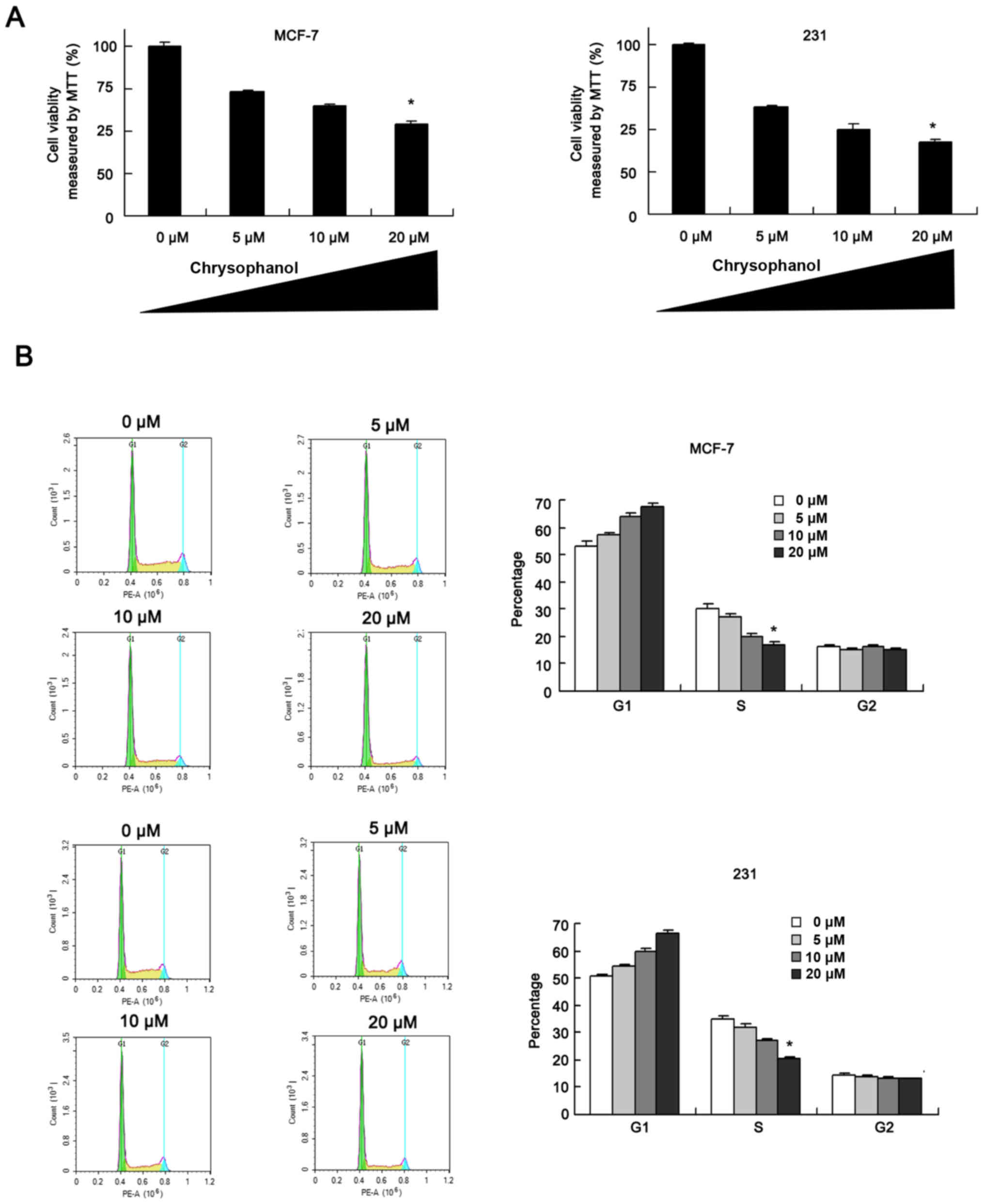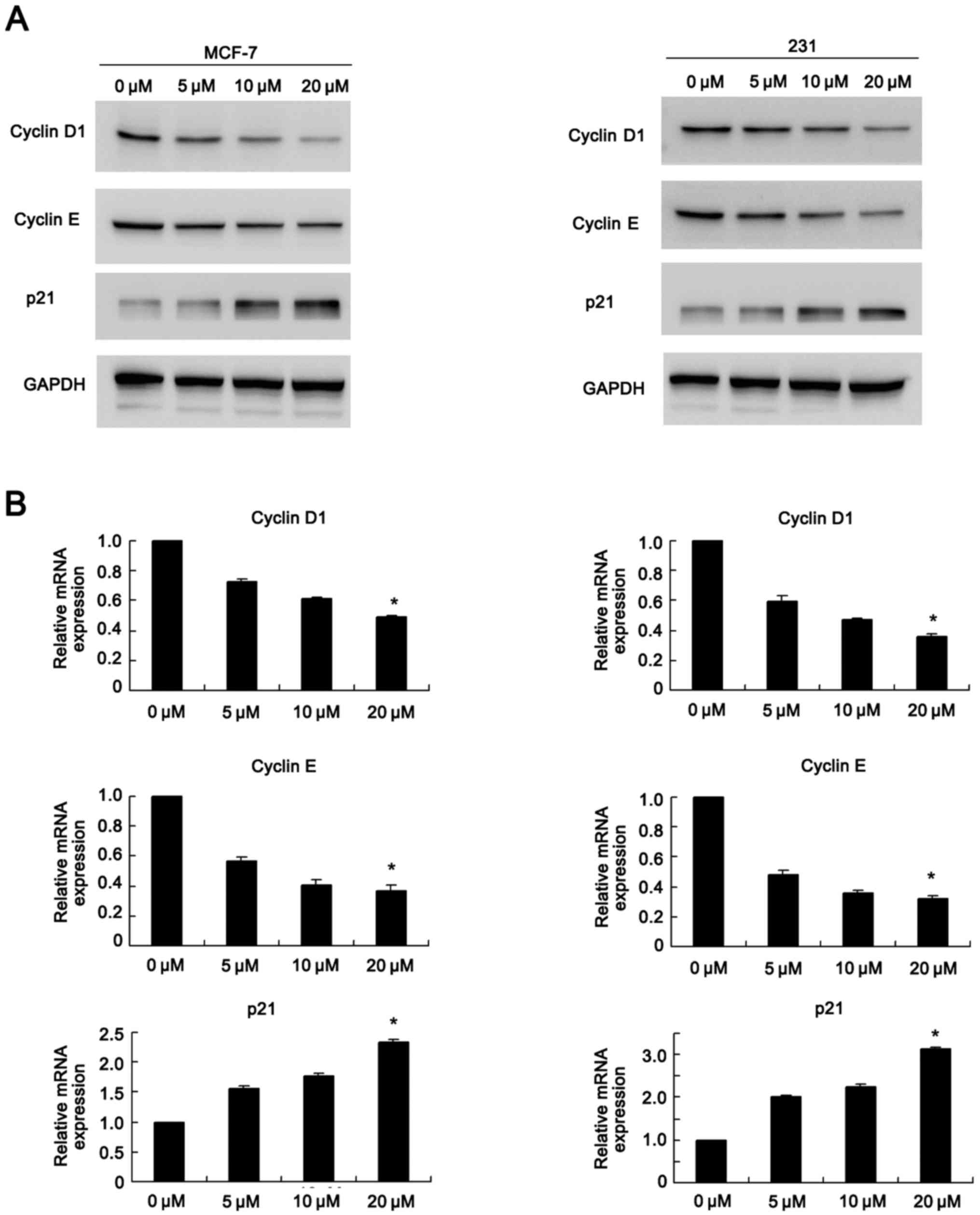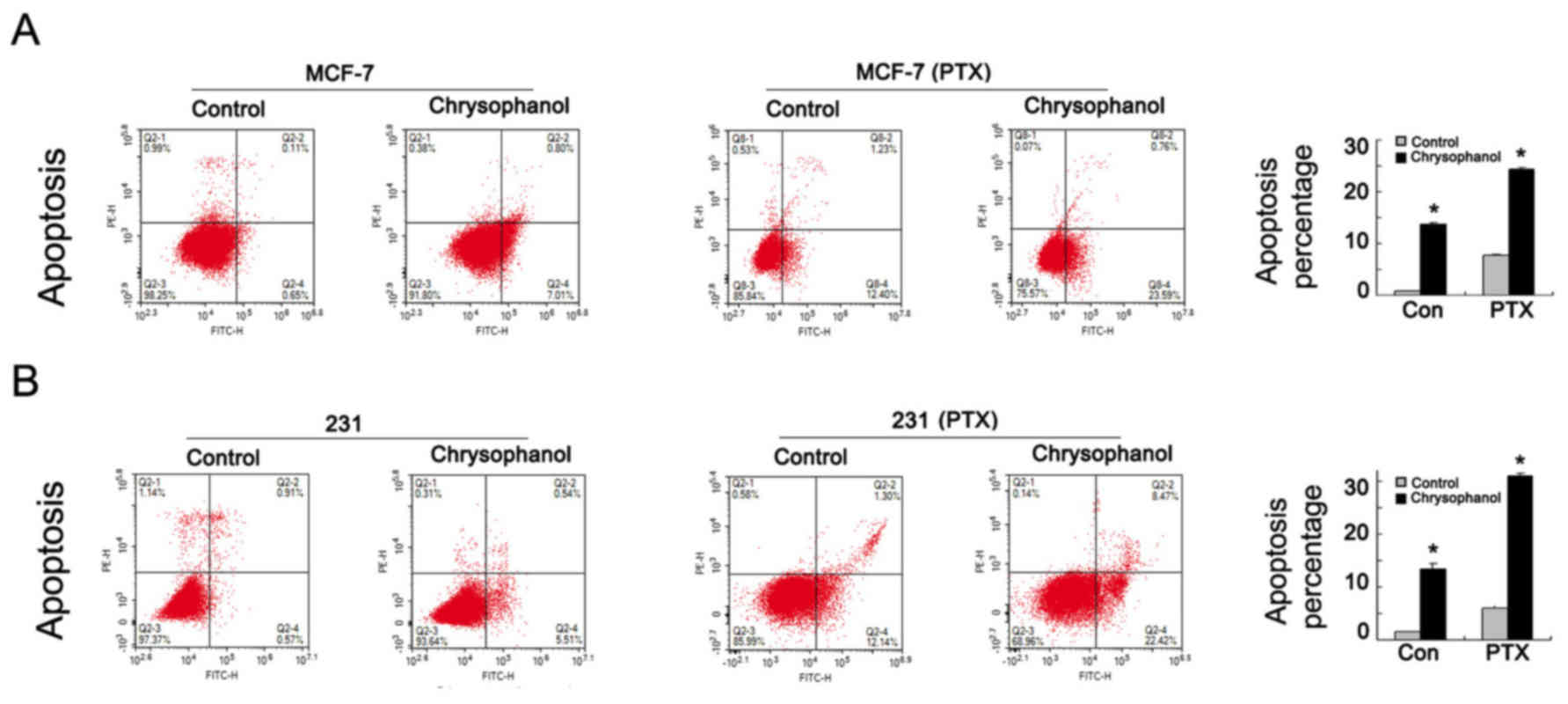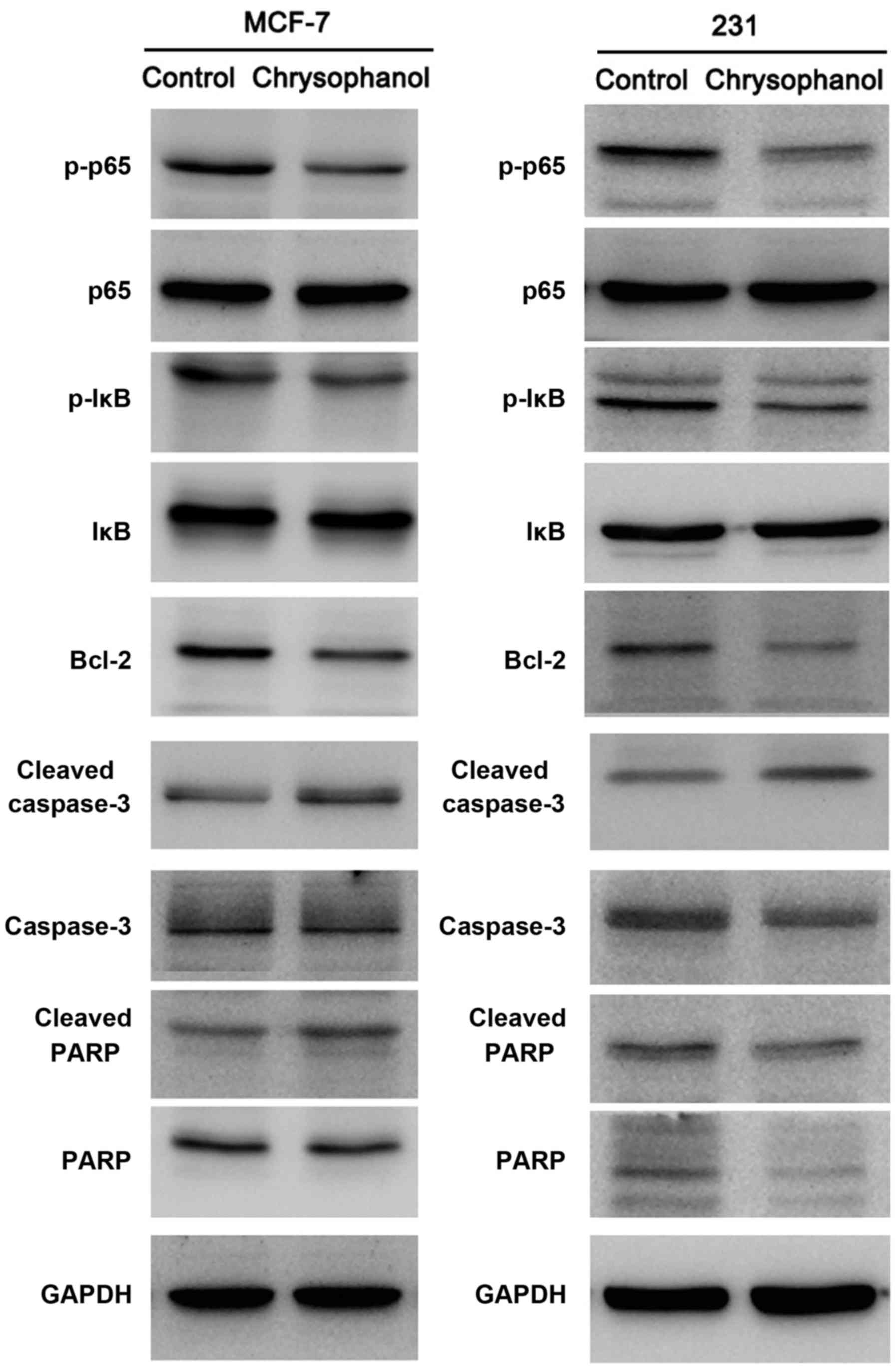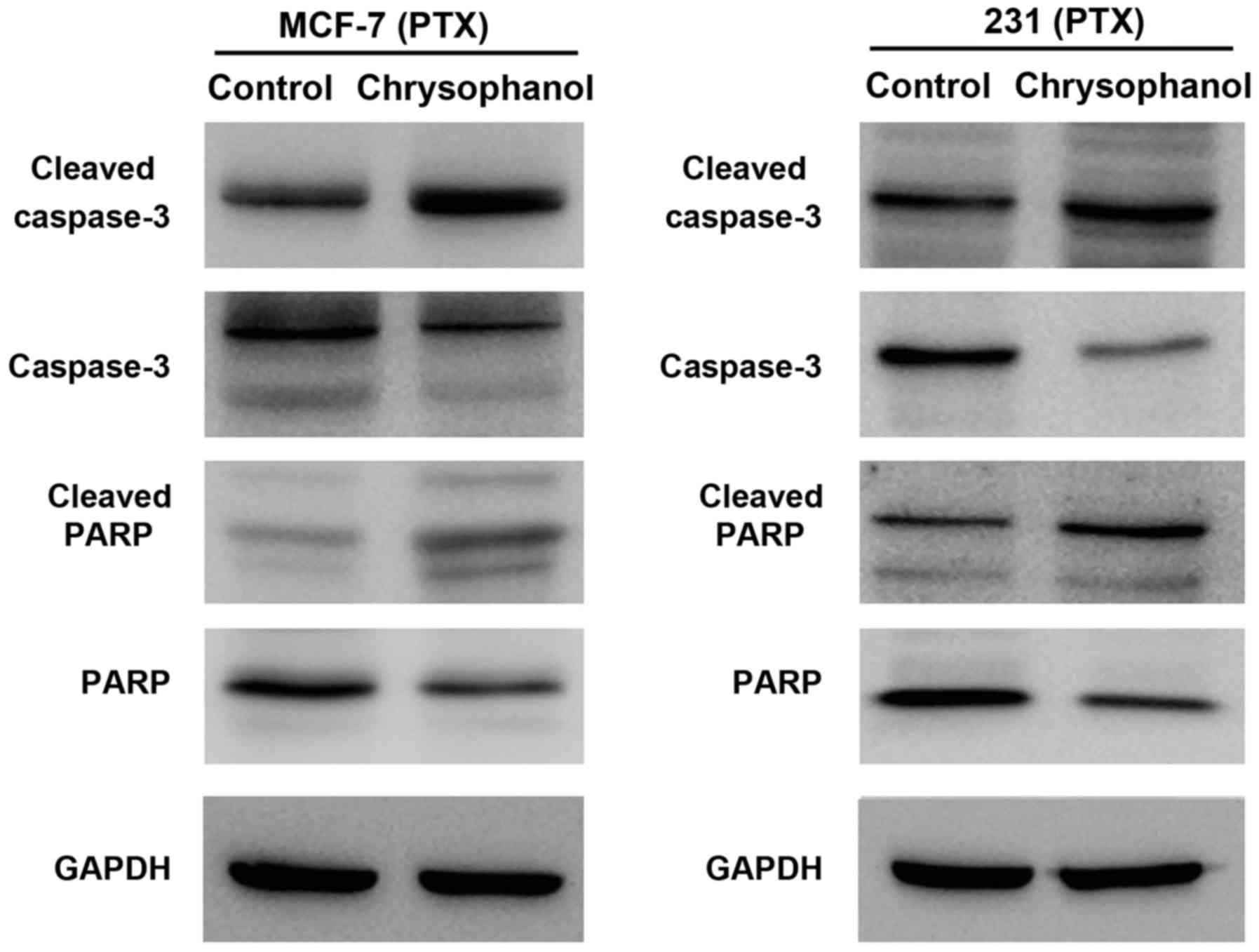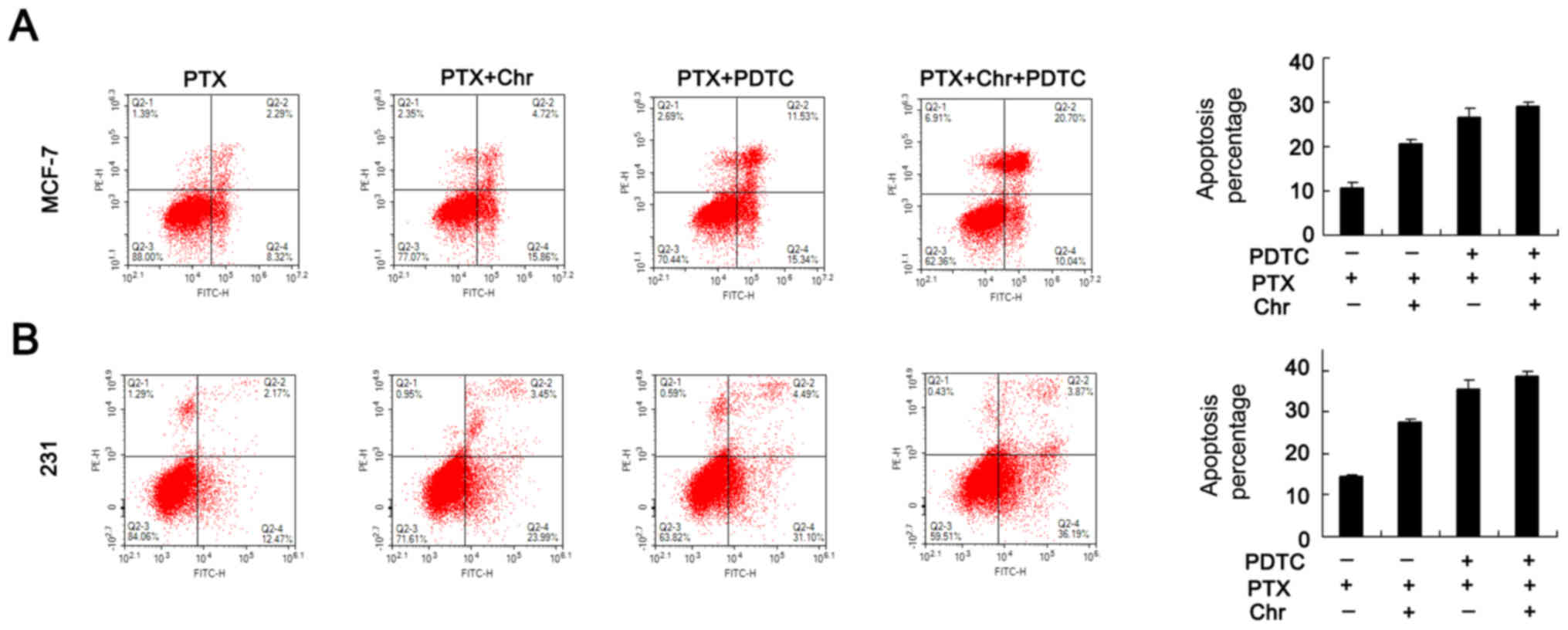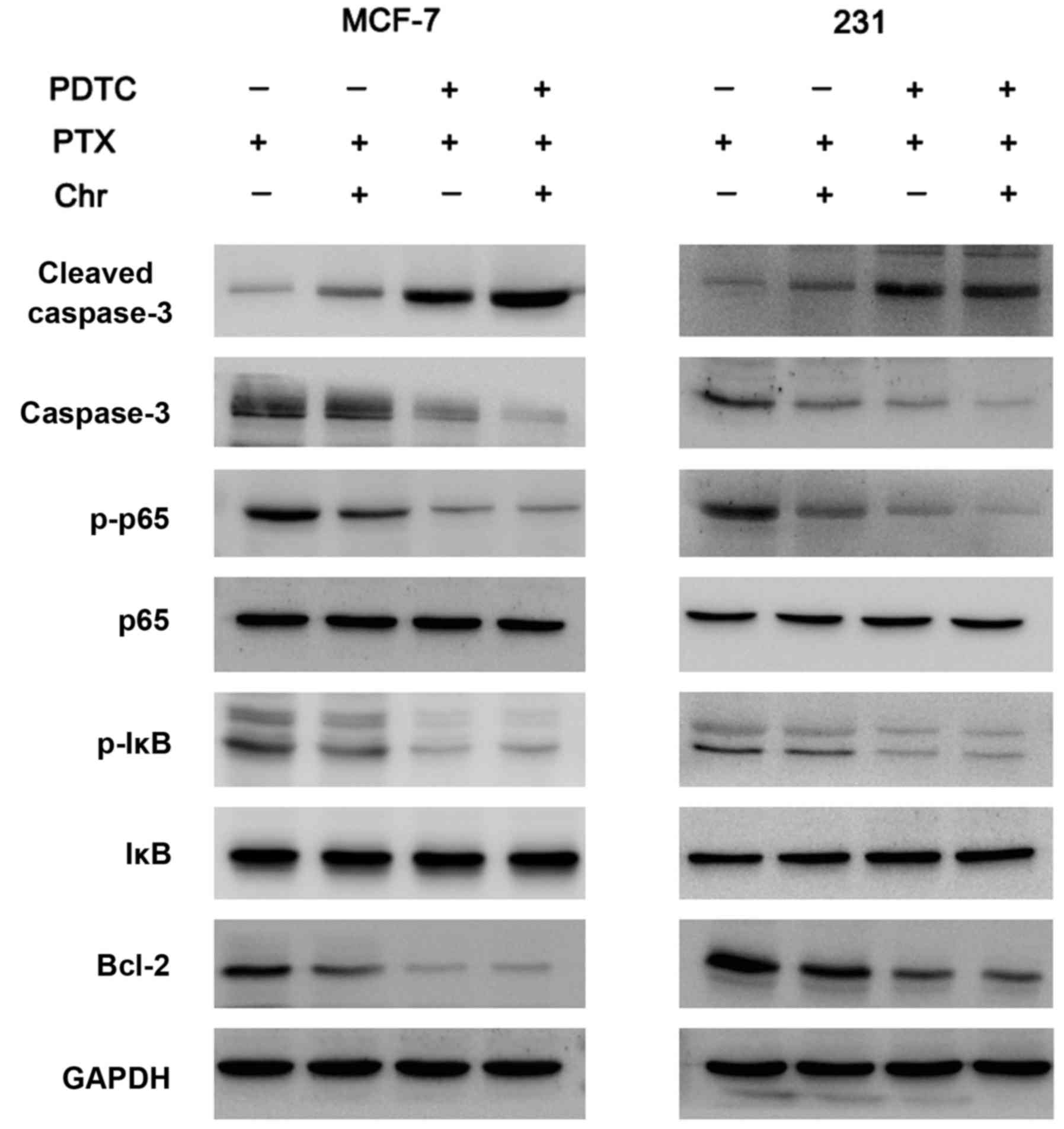|
1
|
Golshan M, Cirrincione CT, Sikov WM, Carey
LA, Berry DA, Overmoyer B, Henry NL, Somlo G, Port E, Burstein HJ,
et al: Impact of neoadjuvant therapy on eligibility for and
frequency of breast conservation in stage II–III HER2-positive
breast cancer: Surgical results of CALGB 40601 (Alliance). Breast
Cancer Res Treat. 160:297–304. 2016. View Article : Google Scholar : PubMed/NCBI
|
|
2
|
Tsuyuki S, Senda N, Kanng Y, Yamaguchi A,
Yoshibayashi H, Kikawa Y, Katakami N, Kato H, Hashimoto T, Okuno T,
et al: Evaluation of the effect of compression therapy using
surgical gloves on nanoparticle albumin-bound paclitaxel-induced
peripheral neuropathy: A phase II multicenter study by the kamigata
breast cancer study group. Breast Cancer Res Treat. 160:61–67.
2016. View Article : Google Scholar : PubMed/NCBI
|
|
3
|
Ni CH, Yu CS, Lu HF, Yang JS, Huang HY,
Chen PY, Wu SH, Ip SW, Chiang SY, Lin JG and Chung JG:
Chrysophanol-induced cell death (necrosis) in human lung cancer
A549 cells is mediated through increasing reactive oxygen species
and decreasing the level of mitochondrial membrane potential.
Environ Toxicol. 29:740–749. 2014. View Article : Google Scholar : PubMed/NCBI
|
|
4
|
Ni CH, Chen PY, Lu HF, Yang JS, Huang HY,
Wu SH, Ip SW, Wu CT, Chiang SY, Lin JG, et al: Chrysophanol-induced
necrotic-like cell death through an impaired mitochondrial ATP
synthesis in Hep3B human liver cancer cells. Arch Pharm Res.
35:887–895. 2012. View Article : Google Scholar : PubMed/NCBI
|
|
5
|
Lu CC, Yang JS, Huang AC, Hsia TC, Chou
ST, Kuo CL, Lu HF, Lee TH, Wood WG and Chung JG: Chrysophanol
induces necrosis through the production of ROS and alteration of
ATP levels in J5 human liver cancer cells. Mol Nutr Food Res.
54:967–976. 2010. View Article : Google Scholar : PubMed/NCBI
|
|
6
|
Zhao L, Zhao AG, Zhao G, Xu Y, Zhu XH, Cao
ND, Zheng J, Yang JK and Xu JH: Survival benefit of traditional
chinese herbal medicine (a herbal formula for invigorating spleen)
in gastric cancer patients with peritoneal metastasis. Evid Based
Complement Alternat Med. 2014:6254932014. View Article : Google Scholar : PubMed/NCBI
|
|
7
|
Hun Lee J, Shu L, Fuentes F, Su ZY and
Tony Kong AN: Cancer chemoprevention by traditional chinese herbal
medicine and dietary phytochemicals: Targeting nrf2-mediated
oxidative stress/anti-inflammatory responses, epigenetics, and
cancer stem cells. J Tradit Complement Med. 3:69–79. 2013.
View Article : Google Scholar : PubMed/NCBI
|
|
8
|
Xu Y, Zhao AG, Li ZY, Zhao G, Cai Y, Zhu
XH, Cao ND, Yang JK, Zheng J, Gu Y, et al: Survival benefit of
traditional chinese herbal medicine (a herbal formula for
invigorating spleen) for patients with advanced gastric cancer.
Integr Cancer Ther. 12:414–422. 2013. View Article : Google Scholar : PubMed/NCBI
|
|
9
|
Lu K, Zhang C, Wu W, Zhou M, Tang Y and
Peng Y: Rhubarb extract has a protective role against
radiation-induced brain injury and neuronal cell apoptosis. Mol Med
Rep. 12:2689–2694. 2015. View Article : Google Scholar : PubMed/NCBI
|
|
10
|
Hong JY, Chung HJ, Bae SY, Trung TN, Bae K
and Lee SK: Induction of cell cycle arrest and apoptosis by
physcion, an anthraquinone isolated from rhubarb (rhizomes of rheum
tanguticum), in MDA-MB-231 human breast cancer cells. J Cancer
Prev. 19:273–278. 2014. View Article : Google Scholar : PubMed/NCBI
|
|
11
|
Liu H, Xu H, Zhang C, Gao M, Gao X, Ma C,
Lv L, Gao D, Deng S, Wang C and Tian Y: Emodin-loaded PLGA-TPGS
nanoparticles combined with heparin sodium-loaded PLGA-TPGS
nanoparticles to enhance chemotherapeutic efficacy against liver
cancer. Pharm Res. 33:2828–2843. 2016. View Article : Google Scholar : PubMed/NCBI
|
|
12
|
Ma JW, Hung CM, Lin YC, Ho CT, Kao JY and
Way TD: Aloe-emodin inhibits HER-2 expression through the
downregulation of Y-box binding protein-1 in HER-2-overexpressing
human breast cancer cells. Oncotarget. 7:58915–58930.
2016.PubMed/NCBI
|
|
13
|
Pan FP, Zhou HK, Bu HQ, Chen ZQ, Zhang H,
Xu LP, Tang J, Yu QJ, Chu YQ, Pan J, et al: Emodin enhances the
demethylation by 5-Aza-CdR of pancreatic cancer cell
tumor-suppressor genes P16, RASSF1A and ppENK. Oncol Rep.
35:1941–1949. 2016. View Article : Google Scholar : PubMed/NCBI
|
|
14
|
Li KT, Duan QQ, Chen Q, He JW, Tian S, Lin
HD, Gao Q and Bai DQ: The effect of aloe emodin-encapsulated
nanoliposome-mediated r-caspase-3 gene transfection and
photodynamic therapy on human gastric cancer cells. Cancer Med.
5:361–369. 2016. View
Article : Google Scholar : PubMed/NCBI
|
|
15
|
Liu H, Gao M, Xu H, Guan X, Lv L, Deng S,
Zhang C and Tian Y: A promising emodin-loaded poly
(lactic-co-glycolic acid)-d-α-tocopheryl polyethylene glycol 1000
succinate nanoparticles for liver cancer therapy. Pharm Res.
33:217–236. 2016. View Article : Google Scholar : PubMed/NCBI
|
|
16
|
Kim SJ, Kim MC, Lee BJ, Park DH, Hong SH
and Um JY: Anti-Inflammatory activity of chrysophanol through the
suppression of NF-kappaB/caspase-1 activation in vitro and in vivo.
Molecules. 15:6436–6451. 2010. View Article : Google Scholar : PubMed/NCBI
|
|
17
|
Lim W, Yang C, Bazer FW and Song G:
Chrysophanol induces apoptosis of choriocarcinoma through
regulation of ROS and the AKT and ERK1/2 pathways. J Cell Physiol.
232:331–339. 2017. View Article : Google Scholar : PubMed/NCBI
|
|
18
|
Liu C, Wu XL, Wu XY, Zhang ZH and Liu XH:
Effect of NF-κB p65 antisense oligodeoxynucleotide on
transdifferentiation of normal human lens epithelial cells induced
by transforming growth factor-β2. Int J Ophthalmol. 9:29–32.
2016.PubMed/NCBI
|
|
19
|
Hsieh SC, Hsieh WJ, Chiang AN, Su NW, Yeh
YT and Liao YC: The methanol-ethyl acetate partitioned fraction
from Chinese olive fruits inhibits cancer cell proliferation and
tumor growth by promoting apoptosis through the suppression of the
NF-κB signaling pathway. Food Funct. 7:4797–4803. 2016. View Article : Google Scholar : PubMed/NCBI
|
|
20
|
Meng Y, Hu J, Chen Y, Yu T and Hu L:
Silencing MARCH1 suppresses proliferation, migration and invasion
of ovarian cancer SKOV3 cells via downregulation of NF-κB and
Wnt/β-catenin pathways. Oncol Rep. 36:2463–2470. 2016. View Article : Google Scholar : PubMed/NCBI
|
|
21
|
Thoompumkal IJ, Rehna K, Anbarasu K and
Mahalingam S: Leucine zipper down-regulated in cancer-1 (LDOC1)
interacts with Guanine nucleotide binding protein-like 3-like
(GNL3L) to modulate nuclear factor-kappa B (NF-κB) signaling during
cell proliferation. Cell Cycle. 15:3251–3267. 2016. View Article : Google Scholar : PubMed/NCBI
|
|
22
|
Park GH, Song HM and Jeong JB: The coffee
diterpene kahweol suppresses the cell proliferation by inducing
cyclin D1 proteasomal degradation via ERK1/2, JNK and
GKS3β-dependent threonine-286 phosphorylation in human colorectal
cancer cells. Food Chem Toxicol. 95:142–148. 2016. View Article : Google Scholar : PubMed/NCBI
|
|
23
|
Yuan C, Zhu X, Han Y, Song C, Liu C, Lu S,
Zhang M, Yu F, Peng Z and Zhou C: Elevated HOXA1 expression
correlates with accelerated tumor cell proliferation and poor
prognosis in gastric cancer partly via cyclin D1. J Exp Clin Cancer
Res. 35:152016. View Article : Google Scholar : PubMed/NCBI
|
|
24
|
El-Kady A, Sun Y, Li YX and Liao DJ:
Cyclin D1 inhibits whereas c-Myc enhances the cytotoxicity of
cisplatin in mouse pancreatic cancer cells via regulation of
several members of the NF-κB and Bcl-2 families. J Carcinog.
10:242011. View Article : Google Scholar : PubMed/NCBI
|
|
25
|
Fennell DA: Bcl-2 as a target for
overcoming chemoresistance in small-cell lung cancer. Clin Lung
Cancer. 4:307–313. 2003. View Article : Google Scholar : PubMed/NCBI
|
|
26
|
Reed JC: Bcl-2 family proteins: Strategies
for overcoming chemoresistance in cancer. Adv Pharmacol.
41:501–532. 1997. View Article : Google Scholar : PubMed/NCBI
|
|
27
|
Abbaspour Babaei M, Zaman Huri H,
Kamalidehghan B, Yeap SK and Ahmadipour F: Apoptotic induction and
inhibition of NF-κB signaling pathway in human prostatic cancer PC3
cells by natural compound 2,2′-oxybis (4-allyl-1-methoxybenzene),
biseugenol B, from Litsea costalis: An in vitro study. Onco Targets
Ther. 10:277–294. 2017. View Article : Google Scholar : PubMed/NCBI
|
|
28
|
Mehmood T, Maryam A, Zhang H, Li Y, Khan M
and Ma T: Deoxyelephantopin induces apoptosis in HepG2 cells via
oxidative stress, NF-κB inhibition and mitochondrial dysfunction.
Biofactors. 43:63–72. 2017. View Article : Google Scholar : PubMed/NCBI
|
|
29
|
Um HD: Bcl-2 family proteins as regulators
of cancer cell invasion and metastasis: A review focusing on
mitochondrial respiration and reactive oxygen species. Oncotarget.
7:5193–5203. 2016. View Article : Google Scholar : PubMed/NCBI
|
|
30
|
Yang D, Chen MB, Wang LQ, Yang L, Liu CY
and Lu PH: Bcl-2 expression predicts sensitivity to chemotherapy in
breast cancer: A systematic review and meta-analysis. J Exp Clin
Cancer Res. 32:1052013. View Article : Google Scholar : PubMed/NCBI
|















